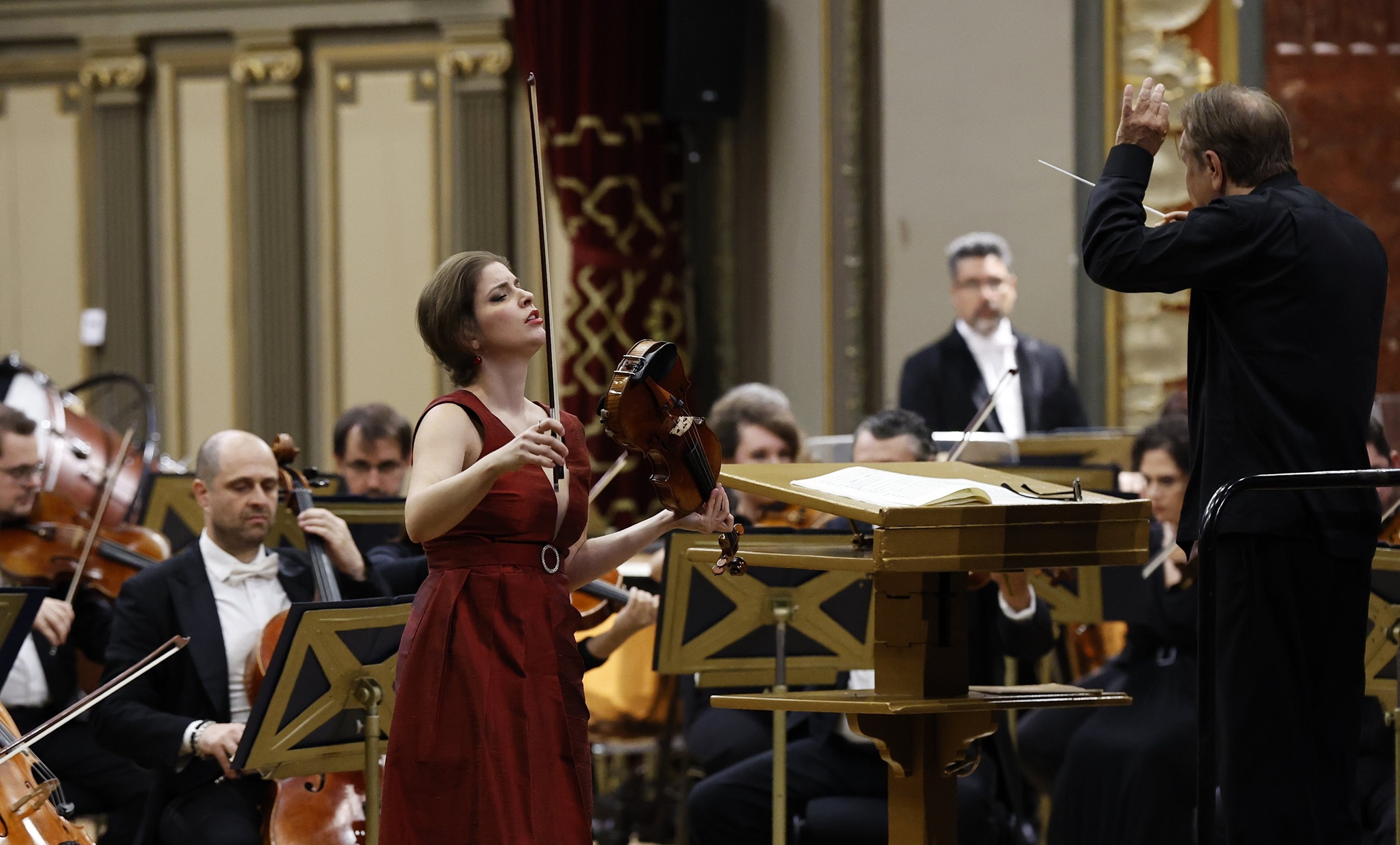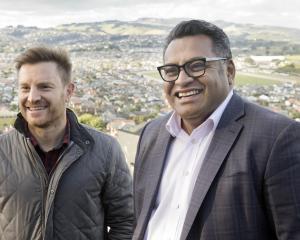
Profesionally Ioana Cristina Goicea loves to tackle some of the most challenging music for the violin but personally likes nothing better than hitting the dance floor when she gets the opportunity.
"Latino is one of my favourite things to dance."
The Romanian-born violinist’s life revolves around music — as well as a solo and chamber musician, she is a professor at Vienna’s University of Music and Performing Arts — so free time is at a premium.
"When there is free time here is finally so many things to do, like that I don’t even know where to start first, but it’s fun, everything is fun."
It is even busier than normal for Goicea as she is preparing to travel to New Zealand for the Whakatipu Music Festival.
The opportunity to visit was one she could not turn down, believing after the Covid-19 pandemic that she might not get the chance to come to New Zealand again.
"I was incredibly happy to do it because I haven’t been in New Zealand since actually 2018."
Then she toured New Zealand with pianist Andrei Gugnin as part of her prize for winning the 2017 Michael Hill International Violin Competition. She also competed in the competition in 2013 coming fifth.
"Coming to New Zealand was the exciting part, I really wanted to come to New Zealand," she said of her initial application to the competition while studying in Germany.
"It’s very exotic for me. Back at that time it was just a destination, it was something almost unreachable, you know?"
Winning the competition was the beginning of her career — helping her become recognised worldwide and in turn receive opportunities to perform.
She went on to win first prize at the German Music Competition in Bonn in 2018 and was a laureate of the International Violin Competition of Indianapolis. In 2019 she became a prize winner of the prestigious Queen Elisabeth Competition in Brussels.
Making the finals of the Queen Elizabeth competition stands out as an important event for her.
"It’s a big deal, so that Shostakovich concerto evening was a very, very intense performance of mine, maybe the most intense so far."
During this time, when she also won the J. Brahms International Competition (2013) and became a laureate of the Fritz Kreisler International Violin Competition Vienna (2014), Goicea performed on a 1761 Giambattista Guadagnini on loan from the Deutsche Stiftung Musikleben Foundation, in Hamburg.
These days for solo performances she needs a more powerful violin so she performs on a J.B. Vuillaume violin, on loan from a private donor, as well as a modern violin by Jurgen Manthey (Leipizig, 2021) of her own.
"The modern one is very bright in a way, but also very powerful. It’s very soloistic, and I like it. And it has colours. And the other one, the French, is also powerful, but in a different way. It’s more, let’s say, more round. It’s more played. They are both great, I really love them both."
Since 2020 when she gained her professorship aged only 27, she has been juggling teaching and travelling to perform.
"It’s great, but it’s a bit exhausting at times, because it’s not only playing, the fun part, it’s like also a lot of practising, a lot of preparation, a lot of repertoire all the time, something else, is that students require sometimes a lot of energy."
Goicea is no stranger to the professional musicians’ life though, as her mother Cristina Anghelescu is a professional violinist and her grandfather Aurelian Anghelescu, a violin professor.
"I have heard my mother practising and playing every day since I was born, so it was quite natural for me to become a violinist. They just taught me violin and I really loved so it’s a good match."
A big fan of Schubert’s music as well as Brahms and Beethoven, Goicea says it is very hard to pick a favourite.
"I cannot name just one, but yeah, Schubert is definitely very close to my heart because it’s the most sensitive music ever. And it just really, it’s very sensitive and amazingly transparent and pure. And I’m just really loving it a lot. I somehow, I feel very emotional always when I’m playing Schubert, it’s just perfect."

"That there not too much ego in all of it, it just has to serve them, that music. And, you know, it’s not virtuosic pieces where you can show off. It’s much more than that."
The reason Schubert comes to mind so quickly is that Goicea is preparing to play his Fantasy (1827) for violin and piano.
"I’m going to play it in May. So I’m preparing this piece and it’s really amazing. It’s very hard for both instruments. It’s actually one of the hardest pieces ever written for violin and piano, both. Like chamber music, but at the same time, very virtuoso and many things are very quiet. So you have to play granissimo in really hard passages. And so it has to be super light and easy. And that makes it very hard to perform.
"But as I said, I love challenges. So I want to play this piece very well."
Preparation for pieces like that one took a lot of time and required some concentration and "smart practising", she said. While she could do it quickly she preferred to have some time and started work on it as soon as she could.
"So you don’t need to spend hours and hours if you don’t have them, but it has to somehow settle. And also technically one has to be very good warmed up when you start practising. So you cannot start immediately with Fantasy by Schubert, you know, you should do your scales. And even if it’s one hour time, 20 minutes has to be some technique. And then you can jump a little bit to the Fantasy, for example."
Each new piece requires reading the orchestra score and listening to other recordings of the piece.
"I’m then reading about the composer, so I just understand what’s about that music, so I mean, intuitively one understands when you play something, you kind of get the character of it, but it’s better if you read some stuff, and you just learn more about the composer, and how he felt when, while he was writing those pieces."
Physical preparation is also important as a violinist, just like a sportsperson, especially as a violinist gets older.
"It has to do with muscles and with the body. So as much as possible [I] workout and sometimes it’s not easy because there is not so much time."
Goicea has recently taken up pilates to help strengthen her muscles.
"I find myself really liking it a lot, but it’s very hard. So sometimes I feel when I’m too tired, for example, I can feel how hard it is. But I have a very good trainer here in Vienna and she’s pushing me very hard.
"So that’s my new goal, the pilates, you know, so that I do it as good as I can."
Another new work she is learning is a violin concerto by Samuel Coleridge-Taylor for a concert at a festival this northern autumn.
"I really like it, because it’s very romantic, and now it turns out that I’m coaching at the Wakatipu music festival a piece by Coleridge-Taylor, it’s the Piano Quintet, so I’m going to know more of his music now."
In recent times she has enjoyed learning a new concerto by African American composer Florence Price and the Ligeti violin concerto.
"Gyorgi Ligeti, crazy, crazy piece, absolutely crazy, I learned it one and a-half years ago, and I mean something more difficult than that, it’s hard to believe, I mean that was really extremely difficult, but everything else seems more relaxed after that."
Next on her list to learn is Shostakovich Concerto No. 2, now that she has played his No. 1 concerto.
"No. 2 is less played, and it’s a great piece as well, so that’s also something that I would like to learn."
For the past season Goicea has been the artist in residence with the Enescu Philharmonic Orchestra Bucharest where she collaborated with the conductors Michail Pletnev and Charles Dutoit.
"Like one month ago, I played in Bucharest, Prokofiev concerto, and the conductor was Maestro Charles Dutoit, so it was really a great collaboration with him, I really enjoyed it a lot, it was a great concert. So I’m also very happy to play always new repertoire, you know, I like to play a lot of concerti and challenges, a lot of challenges."
To see
Ioana Cristina Goicea , April 18, 7pm, April 19, 3pm, Whakatipu Music Festival, April 18-21, Queenstown.











